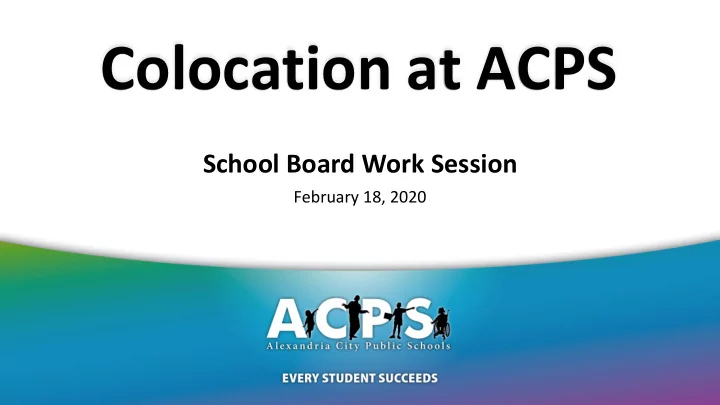

Colocation at ACPS School Board Work Session February 18, 2020 www.acps.k12.va.us
Essential Questions • What is Colocation? • What existing colocation do we already have at ACPS? • What are some future types of colocation that could be explored at ACPS? www.acps.k12.va.us 2
Task Force Outcomes From Ad-Hoc Joint City Schools Facilities Investment Task Force Recommendations (January 2018) • Recommendation 8 : “We recommend that leadership proactively challenge traditional practices and methods for capital project and service delivery by exploring new best practices to keep Alexandria competitive and attractive to potential partners and developers. This includes embracing opportunities such as public private partnerships, joint use, co-location , shared municipal services, adaptive reuse, and others as identified.” (pg.5 and 28) • Part of Recommendation 10 : “The decision -making body and/or champion should refine and review existing standardized written agreements, develop new templates that support project strategy development and negotiations, and monitor compliance and adherence to those standards, which include: – Facility design standards – Physical parameters and guidelines for capabilities and services – Co-location guidelines and agreements – Financing strategies” (pg. 32) www.acps.k12.va.us 3
Joint Facilities Master Plan Open House 2/13/20 What is Colocation? There are many types of colocation – one size does not fit all – and there are many terms used to describe colocation. Colocation Type Defined Shared Site Side-by-side uses on the same site, but not in the same building. Uses may be public or private. Shared Building Uses within the same building, but not always sharing space. Building design and zones may keep uses separate if desired or select shared zones. Shared Space Uses that share specific spaces or areas such as lobbies, meeting spaces, restrooms, gymnasiums, fields, etc. Shared / Other Public To include more broadly defined uses of public interest beyond City services Benefits or Interest Public-Private Implementation of a colocation through a partnership with the private or non-profit Partnerships (P3) sectors. www.acps.k12.va.us www.acps.k12.va.us 4
Colocation in ACPS The following are examples of colocation, shared use and partnerships within Mount Vernon Community School Patrick Henry Elementary School & the Alexandria community at & Recreation Center and James Recreation Center ACPS locations. Duncan Library John Adams & Early Childhood Teen Wellness Center – T.C. Williams Ferdinand T. Day Elementary School Center; Headstart programs in Adaptive Reuse of Office Building – Partnership between ACPS and multiple ACPS facilities Alexandria Health Department Elementary School & Future ACPS Admin Partnership between ACPS and Campagna Center www.acps.k12.va.us www.acps.k12.va.us 5
Potential Colocation Opportunities Below are just some of the colocation opportunities that could be explored at school sites in the future: • Expand recreation colocation to have recreation programs open during school hours. • Increase library services at schools, including after school library use • Colocate VPI and partner pre-K in new facilities. • Offer health services at school sites. • Create community meeting space in new schools. www.acps.k12.va.us 6
Questions? Erika Gulick Director of Capital Programs, Planning & Design erika.gulick@acps.k12.va.us Superintendent School Board Meagan L. Alderton Michelle Rief Dr. Gregory C. Hutchings, Jr. Ramee A. Gentry Christopher A. Suarez Cindy Anderson, Chair Veronica Nolan, Vice Chair Jacinta Greene Heather Thornton www.acps.k12.va.us 7 Margaret Lorber
Recommend
More recommend